The goal of the workshop was to foster a creative safe space for the participants to unwind/unwound with a pen and paper. Using the self as a tool to navigate the boundaries of our shared vulnerabilities, we used creative strategies ranging from experimental poetry prompts to new materialist feminist research and arts-based methodologies. Collectively we created a time and space to write, reflect and reshape our woundings. After a short overview of the key theoretical concepts and inspirations, I proposed a series of writing prompts that engage with the relationship between the body, writing and the materiality of the paper. We worked both on individual as well as collective exercises. There was a space both to share as well as to contemplate in silence around our wounds.
With this activity, participants could (re)consider the potential of creative writing methods for contributing to feminist materialist research. My goal was to examine how to use creative writing prompts not only as a way of tapping into existing memories and generating material as they would be used in creative writing workshops, but as a creative methodology for researching intangible and painful topics.
The enclosed poems are a result of a collective writing process, inspired by Dadaist cut-ups as well as Bellamy’s cunt-ups.
Not her, she’s a stick
The pain, that’s the shape of mother
That is, her beach body on a new day
I’m squeezing my way into a place where I don’t belong
It’s present, physical, too intentional
I’m getting out, hard
Reject me on a new day
I’ll make it out there alone
(collected by Linda)
Her stick will hit right where
It’s the most painful, mother
Self-loving body day
Not physical, nor intentional
It is getting harder to be
Rejected anew
To make out alone
(collected by Wassan)
Cheating. Squeezing your way into a place where you don’t belong.
Getting out there every day anew.
They know you are fraud,
you know it too.
And yet, too opinionated, too stubborn,
You refuse to give up, to get out, to prove them right.
A scar is a healed wound —
it means not bleeding.
You have many of them.
(collected by Lusy)
text by: lilli, val, & mae
photos & drawings: lilli
-1-
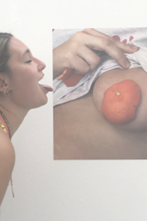
“Intellectually, non-monogamy made complete sense; emotionally, it felt like sandpaper across my eyelids”
Zoe Whittall
I think about the day we went out to this lesbian bar in Barcelona, was it the first night we were there? I watched you two exchange glances, laughs, and observed the tension between you two grow. Was it me who encouraged you two to finally kiss?
Yes!
It was one of our last nights. On our first night you arrived a little later than me and without many words shared, you fell into your beds in your separate room. I remember putting a tray with coffees in front of your door the next morning- I didn’t want to wake you but still wanted you to feel my presence and to feel connected to you (even if it only being the coffee my hands made touching your lips). I met you later that day on the beach.
I remember being excited and a little scared, scared that both of you will be in an entirely different dynamic as what I shared with Mae till then, scared that Val might intimidate me, scared Val might not think I’m intelligent or interesting, just a scared kind of excitement.
We kissed in a bar
outside of it
after spending the evening drinking sangrias and playing this lovely game.
I told Val that the only thing I could think about -Val do you remember?- was kissing her. And I remember the woman we took home with us later telling me that she thought we were together, we must have vibrated with love. Last Sunday we went dancing together and everyone there said something similar. That our love was streaming everywhere, pouring, elevating…
I remember your smile, the orange wall behind you. So funny that orange seems to be with us all the time now. I remember for just the shortest while, I saw you through Mae’s eyes, whose presence made the moment all the more special. I thought I was looking at you as my best friend of five years, as someone I had kissed before, merged with a val-perspective of nervousness, shyness, newness. I needed Mae’s existing love for you to give me courage and hope. It sits at the sandy foundation of everything you and I have built since.
I recall you really seeing each other for the first time in front of my eyes. It was as if I was an essential part of it and as if I wasn’t there, included and excluded at the same time. The way you two connected over things I knew I would never understand, the way you passionately shared thoughts and experiences, getting each other more and more every day, your desire for more apparent.
I find this such an interesting concept in nonmonogamy, especially in triads or v-dynamics: someone brings others together, in that sense they are an integral component of that love, but it’s also outside of them, its very own relationship, thereby also the embodiment of a selfless love: where you can hold and even celebrate that which lives completely outside you. Though I wonder, if it touches those you touch, loves those you love, can it ever truly be completely outside you?
-2-
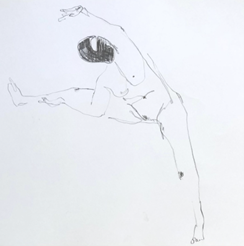
“A world where it is safe to love
is a world where it is safe to live”
Serena Anderlini-D’Onofrio
In January Mae and I were lying in my aunt’s bed. We were supposed to write an open call for a zine but instead had coffee after coffee talking about our future, about living possibilities, family constellations, languages shared, and things varying between the three of us. We talked about places we could move to, children we could raise, days in faraway years we could spend together.
We were both shaking from caffeine overdose.
This dream moves me.
-3-
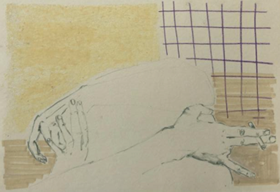
I was filled with joy being by your side as your relationship developed. Imaginaries of our future together tangible. Sometimes, all of a sudden, especially when I was gone and you took that trip to the Netherlands together, I felt alienated, I had to cry, not necessarily sure of the cause. Was it because I was told that love is limited? Worried that there might not be enough of it left for me once you come back?
I am still scared sometimes.
I remember my body being filled with happiness. How I wanted all of it, share my life with the both of you, see all the directions our relationship will take us, to forever feel this craving of my mind and body for your touches and thoughts. This scares me and also, I am scared I cannot switch off the voices society has been implanting in my head for over twenty-five years [I know it is ok to share these fears].
I feel this too! I get so scared sometimes. Scared I will be left behind. My ultimate “bottom of the anxiety spiral” fear is: no one loves me like they say they do, and everyone will leave me behind. I totally get this. I sometimes wonder if what I’m trying to create is absurd and idealistic. I don’t know. But absurd and idealistic have usually been the backbones of revolutions. So here we go.
The fear that you are not enough will seep beneath your bones. Sexual exclusivity does not protect you from the deep rooted insecurity that you are not worthy of love. I am at times still nothing less than existentially afraid. Afraid I’m not as good as those my partners love. Not as hot. Not as smart. Not as interesting.
This is such a wonderful opportunity to look within myself and continue to walk the path of self-love and self-sufficiency. To see that I, in my flaws, my shortcomings, in the ways I cannot measure up to every other person on this Earth, am special. Like no one else. That when I am loved it is not because I am selected as superior to other potential lovers, but because I am me. Comparison is a demon you battle with perpetually in polyamory – but I assure you the work she beckons you to begin is worth each heartache and each tear.
I’ve felt my ground shake through every inch of this process. Every twist and turn that it takes you on. And yet I have always found it worth it. Everything we end up learning, the way we get to have evidence that we are programmable – that we have agency in our thinking, our feelings, and our behaviors – a quintessential psychological wellbeing marker.
Yes! I always think of my own efficacy and the neural plasticity -that you, Val have taught me so much about- as a central point of my poly journey… how I navigated my own jealousy, changed my reaction patterns. I was neither born nor socialized non-monogamously, rather I made myself to be that!
How empowering!
As for me… even though with the years I have definitely gained confidence, I still, at times, wonder if I, we, will ever be able to completely turn these voices off. Each vision of the future we share is at the same time beautiful, full of love, and suffocating, overwhelming. It pisses me off that we do not exist without the context of our queerness, we like it or not, our lives are political, and our love is an act of rebellion.
I guess it is kind of hard to dissect these voices and thoughts- there is literally not one message about love that I received as a child that wasn’t meant to convey monogamy and how I should always and forever seek it! In most cases, it was heteronormative monogamy! Through every canal, my brain, heart, and being has been socialized and conditioned to seek this single person to fulfill all my needs, forever.
EVERY TEXT IN MY LIFE, yes, everything, music videos on MTV, every dating show, EVERY song, advertisement, magazines, photo love stories in BRAVO, documentaries and films I watched on TV, I wasn’t allowed to watch Disney movies but even the Arthouse or Indie productions my mom let us watch: everything told me that one day I will find that ONE person and we will be happy forever.
Sometimes I cannot believe the power of storytelling, of the story we were told our whole lives, the story about half oranges, monogamy, and the limits of loving.
-4-
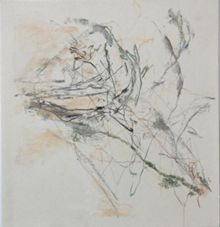
“The point for me is to create relationships based on deeper and more real notions of trust. So that love becomes defined not by sexual exclusivity, but by actual respect, concern, commitment to act with kind intentions, accountability for our actions, and a desire for mutual growth”
Dean Spade
I would like to be able to love you and plan the future without having to consider the legislation that discriminates against us, my home country in which we, both because of our queerness and polyamory, are seen as freaks, “unnaturals”. How much work do we have to invest in order to stay strong, build resilience against the accusations, doubtful looks questioning our existence?
I constantly find myself explaining. Val I love you and I love that you do so much of that work for me, you are educating me in so many ways when it comes to deconstructing and politicizing my love! I don’t think I ever had to explain why I date whom or how I date until I started to date non-monogamously. People constantly feel the need to guide me back to how I used to date…. I get a lot of questions like: but does it make you happy? how do you manage? but you never seemed to love like that? I think it is sweet that my friends care for my happiness, and I love talking about sex, dating, and love, I just sometimes feel like it is this extraterrestrial thing that could not possibly be the end goal…
And very often do I hear “I guess it makes sense on a theoretical level, but I could never….” sometimes it seems to me like people are not interested so much in whom I’m dating but rather in how I’m dating. I heard on the Multiarmory the other day that if someone breaks up with their monogamous partner, you always talk about the individuals and the dynamic but if there is a shift in the relationship of non-monogamous partners, society very quickly only looks at that aspect, being that it was a non-monogamous relationship!
Yeees, because every time a poly couple breaks up it is ONLY because of being non-monogamous and it is ALWAYS the proof of non-monogamy being impossible!
I also feel like I want to tell everyone that it can be hard sometimes, that I do feel jealous sometimes and that I have fears and anxieties. I want to do that to also make the image of non-monogamy differentiated, to make it flawed sometimes, dreamlike at other times – it’s like for me when I first read “In the Dreamhouse” and felt so empowered by the imagery of a toxic lesbian relationship, of not having to always make it better than perfect so people think its valid like what the fuck?! But why do people think fear, jealousy, and anxiety only exist outside of monogamy?
When I told my mom the other day that I was developing feelings for someone who dates non-mono-gamously she was so shocked and immediately told me to let go of that person and that I was worth so much more…. I kind of feel like I always have to convince people that what I’m doing is exactly how I want it!
That is why I at times prefer not to tell people about the way I love, as they plant doubt in my head, and even though I have been dealing with it for the past years, I am sometimes tired of explaining my love over and over again, justifying it, my needs, my way of living and doing relationships. And I still have not told my father about any of this… and so, just like many other queer people, I live a double life…
-5-
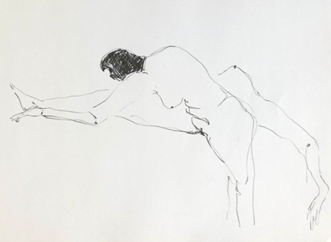
Yesterday I read this thought in an article on critical whiteness where it said that, yes without subjectivity there would be no politics but that politicizing doesn’t necessarily need to only come as a logical consequence of personal experiences; that it can also come from a critical analysis of our society. I guess what I want to say with this is that I kind of hope that the work can be shared among all of us, that you do not need to live and love non- -monogamously to start and see what is happening on a political (patriarchal) level when it comes to the structuring of so society in monogamous units.
I agree, but from my perspective, there is a certain power that comes with living it, despite all the questioning and doubt.
True. We do not only choose the life we want but also set an example that it is in fact possible.
I often reflect on my non-monogamous journey, and I am sure that one of the most important aspects that led to me living my happy poly life was having so much support from other non-monogamous people around me. Even mine and Val’s journey over the past six years, supporting each other in the navigation of first our other relationships, and then through the development of this relationship… all of this would have never been possible without Multiamory, Ethical Slut, my psychologist, and all of our beautiful friends sharing their experiences, speaking from their hearts about their fears, difficulties, and encouraging each other to live without a script, to reinvent ourselves and to try again and again and again.
-6-
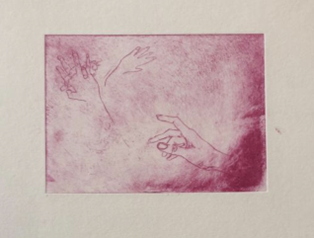
Having read about the history of monogamy, marriage, or heterosexuality, three frameworks that have been unfortunately dovetailed in our society, I have learned just how problematic and anti-liberatory their histories are. By finding new ways to love, to be inclusive in our hearts, we make the personal unbelievably political: we bring put in the work to open our minds as well as our behavior to the multitudes of possibilities – the very essence of queerness. To commit to allowing, to leaving space, to not centering yourself are all acts of great love, not just for your lovers, but for society. When we de-couple society and we un-center the family unit, we facilitate for a more communal and equal place, where resources, both figurative and physical are more aptly distributed and shared.
Our love is political. Monogamous heterosexuality as having anything to do with love is basically a relatively recent construct designed to benefit an industrial-capitalist-patriarchal-white supremacist society. Anything that challenges the traditional structures of families threatens the very social fabric they are meant to represent.
Yes! Let’s threaten monogamous hetero-sexuality by loving each other! How simple, and yet powerful. Being able to voice our experiences is a tool we can use to stretch out the notion of “the norm”.
Sharing experiences through narratives is a political act, because of that queer temporalities thing -that you know about because you went to my talk- i.e. one way to kill queers is to take a future from them by removing any representation or also my straight up removing queers (ex. Inept response to aids crisis, homocides, removal of access to health care, job access, social mobility, etc, etc). So when we SHOW the community there is a WAY to be alive and THIS is what it looks like we grant LIFE.
I agree – one of the strongest tools of oppression is silencing. Every narrative makes reality more layered, deeper and more differentiated – therefore talking about your own experience and talking about our love story adds to the definition of queer non-monogamous love, or actually just to the definition of love.
So let’s shout, write, create, speak up about it, let’s challenge the dominating narrative by loving and sharing! Both for ourselves and our family, to make it easier for others, to offer them an example they can go by. To be queer, to deconstruct, to recreate, to understand relationships AS CONCEPTS that have infinite possibilities. To encourage others to feel connected to their needs, to feel the fresh air of freedom that comes when we let go of complying with unrealistic societal expectations.
-7-
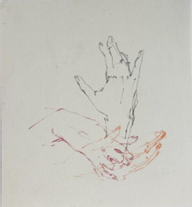
In the “Art of Loving”, Erich Fromm writes about how love is not something that should end in its object: “If I truly love one person I love all persons, I love the world, I love life. If I can say to somebody ‘I love you,’ I must be able to say, ‘I love in you everybody, I love through you the world, I love in you also myself.”
Love can be expansive – a practice, a political act of resistance in a world that has asked us to demurely attach in symbiosis with one chosen person in a heteronormative dynamic.
I love love. I love being a part of it, to receive it and even more to give it. But I also love to witness it, to be a guest in someone else’s love, to be sprinkled with the same magic that exists between others.
How privileged I feel to have come across the people and knowledge necessary to develop the skills to expand my realities and deconstruct the art of loving. How lucky I am to have found you. The love you share -with each other- has created a nest, a sense of family to which I know I belong, and to which I will come back. I know there will be challenging times, but I do not fear them. Your hearts are my home, they do not scare me. I want to gift you with my full trust and my life. So, despite all the obstacles – “let’s love fully, let’s love loud, let’s love now”[1].. and let’s make that love contagious.
[1] Soko, We Might Be Dead By Tomorrow
by Leonie Ortgies
“My head is swimming. I can feel my heart pounding. My breath comes fast. It’s not that bad, I tell myself, over and over again. And on some level, I even know I’m right. But it doesn’t seem to matter. I feel so tired. My own body doesn’t feel like home. Why does every piece of clothing I own seem to constrict my chest and make it hard to breathe? Trying on so many clothes is exhausting. I wish so badly I hadn’t gained that weight and my clothes would still fit me right. This outfit is a little more relaxed, but does this look stupid now? Like I’m in my pajamas? This is so ridiculous, I know everybody at that party, I even like most of them and I’m pretty sure they all like me. They don’t care what I wear. But will I even be able to keep smiling and make small talk, I haven’t been to a party in over two years, I haven’t even hung out with more than three people at the same time. And I have to take the tram, stay on my feet the whole evening, dance, laugh, be friendly and happy. I don’t even know if I can keep up my attention span for longer than an hour. How I can feel so anxious and stressed over a simple, small birthday party? Am I the only person in the world who feels panic, social anxiety, self-doubt and shame over something so trivial?”
L., 27 years old, university student of gender studies
“Lost deep in thought, as I always get after therapy, I am walking home as I have a hundred times before. Suddenly, something feels different, though. I keep walking straight ahead but center my attention on my surroundings. Everything seems fine, but I can’t get rid of this nagging feeling like someone is watching me. I try to cast a casual look over my shoulder. There! There is someone walking behind me. For how long? I can feel my whole body start to stiffen, but I force myself to keep up the relaxed walk, even though everything inside of me is screaming at me to pick up the pace. On high alert now, I automatically scan the street ahead of me, evaluate the buildings for a place to run to, is there anybody else around? Where are my keys, what else do I have in my bag, did I grab the pepper spray this morning, what did they teach us in self-defense class, walk upright, look confident, you’re not scared–. What the hell? What is wrong with me? Don’t be so paranoid, why do you always see the potential threat first, come on. I mean, is this even justified? Am I judging this whole situation wrong? Maybe that person is just going in the same direction, that doesn’t have to mean anything. Shit, I always do this, I feel like all the isolation during the pandemic has set me back to the confidence and the knowledge of human nature of my 19-year-old self, or the lack there of. I didn’t used to be so bad at judging and navigating social situations. What happened to me?”
A., 28 years old, training to be a kindergarten teacher
“Slightly out of breath, I arrive at the lake and attach the lock of my bike to a nearby tree. It is such a beautiful day; I can’t wait to jump into the water! I put my blanket down, take off my shoes and get my towel out. For a second, I simply enjoy the feeling of the cool grass underneath my bare feet. As I move to take off my clothes, I get weary in an instant. I hesitate. In a moment, everybody will be looking at me. And I know I’m not just imagining that, because I know I do the same thing to other people, watching them and and comparing their bodies to mine. They’re gonna see my love handles and the cellulite on my legs I could never get rid of. Wistfully, I think about the body of my 21-year-old self, so fit, so free of wrinkles. I look at the people around me and ask myself, why can’t I look that slim and fit, did I really have to eat that whole box of candy last night, why can’t I for once manage to stick to my workouts? I hope my hair isn’t looking too greasy. I was in such a rush this morning, I didn’t have time to wash my hair, I don’t want to look like I don’t have my shit together–. Just in time, I notice the bad direction my thoughts are heading and try to remind myself, why I actually came to the lake. I wanted to enjoy myself and relax. It’s okay and understandable for these thoughts to come up, but I don’t want to give them too much power. I start thinking about all the progress I have made, being able to remind myself that these negative thoughts are just insecurities. They don’t actually have anything to do with how I see myself. I manage to calm myself down, undress and sit down on my blanket. When I reach for my bag to get a sip of water, I catch myself quickly checking, when I last shaved my legs. Thank goodness, they’re still fine, not perfect, but fine.”
T., 29 years old, social worker
“You’re overreacting. How often have I heard this sentence? This accusation. This assumption to understand my feelings better than myself. Don’t I have a right to feel angry? Isn’t it good and healthy not to bury it? Would you say something like that to your friends? I can’t even describe how much that pisses me off. Why couldn’t you have said something like, I feel like you are very angry, I don’t really understand why, can you explain it to me? Is that too much to ask?
Or were you right? Was I overreacting? Am I being too sensitive about that word? Maybe my reaction wasn’t completely reasonable. But being the only two residents on this deserted island for what felt like an eternity, I have had to swallow a lot of feelings, a lot of anger, frustration, loneliness. And guilt over feeling lonely, frustrated and angry with you, because I love you, but I just couldn’t help feeling this way. This lockdown has really tested me and you, I felt like I had to prioritize your well-being over my own, because you were struggling more. And I would never judge you for that, but it’s been hard for me too and I have had to carry a lot of the weight by myself. Not knowing how long this situation would last, I felt like I had to accept it and find ways to survive, like I couldn’t afford to feel this bad. It’s been so silent, no distractions, no balance, no purpose, locked in with my own thoughts. I’ve certainly learned the hard way how important it is to communicate my feelings, how burying them can cause serious damage without me even noticing it, before it is too late. I learned that my feelings are just as important as yours and I don’t do either of us any favors by not voicing them.
But that’s in the past. Now my life can finally begin again, my mind breaking free of all the strain of the past months. If you told me now I was overreacting, I think I would act differently.”
A., 27 years old, university student of art history
The Project
In this project, I explore similarities between the experiences of social pressure among women during the ‘re-opening phase’ of the COVID-19 pandemic, investigating if this pressure is directly connected to gender or the perceived expectations linked with gender.
The pandemic was a time of isolation for many people, social interactions (especially in groups) were considered risky, irresponsible and to be mostly avoided. For many people it was a drastic change spending so much time alone or with only a few social contacts. People had to learn and become accustomed to different methods to stay in contact with friends and family like social media, video calls etc. Now, coming out of (at least the legal restrictions) of the pandemic, many people may feel that they are expected to behave and live exactly the way as before, but many may struggle to do so.
Considering Judith Butler’s theory of gender performativity, it raises the question what role gender plays in the social pressure experienced during the re-opening phase of the pandemic. Butler suggests that we are not born with a certain gender, but rather that we learn how to perform gender from the moment we are born, based on gender-specific behavioral expectations. Whether rejecting these expectations or trying to live up to them, they can cause people to experience social pressure. They can cause stress, anxiety and actual pain.
The question is, what consequences arise after a phase of social seclusion to alienation and an unlearning of previous social practices?
I conducted interviews with women from my close circle of friends and asked them about their experiences with social pressure and social anxiety. I asked them about specific situations, about their feelings and observations and if they saw a connection of these experiences to their gender. Inspired by these recollections, I wrote four short stories in gender-non-revealing language, one of them from my own perspective, the others based on the interviews. The use of gender-non-revealing language means to make it easier for more people to identify with the protagonists and not (perhaps subconsciously) build up a certain distance when realizing the narrator identifies with a different gender than the reader. Showing the unique experiences these women make, I give readers insight into perspectives they otherwise might not have access to.
The interviews with four different women showed that they are struggling with many problems they were already struggling with before the pandemic. Some problems seemed to have escalated due to the long periods of isolation caused by the pandemic. Above all, the participants described questioning their own feelings or their judgment of social situations. Rarely participating in social events led to a perceived lack of practice and heightened feelings of insecurity.
However, differences in experience could be observed between the women as well, due to different job and life situations. T. didn’t experience the pandemic as isolating as the other participants, because her day-to-day life as a social worker continued almost exactly as before. She still met friends and family and was generally more impacted by stores being closed than by social isolation. A. on the other hand spent a long time confined to her apartment with her boyfriend, which caused a lot of psychological pressure and stress for her. L. also felt very insecure about a social gathering, because she hadn’t been part of one in years.
This project has certainly affected me on a personal level. I could personally relate to every story I was told by the participants, and I enjoyed seeing participants relating to each other’s stories as well. It was a relief to learn that many of the issues I have been experiencing were shared by other women as well. I believe that social pressure and the stress it causes is an important topic to talk about. It has a significant impact on a political and societal level, as people may struggle a lot more with conditions at their workplace and during everyday interactions after the pandemic. As a society we need to acknowledge the changes we have went through and address them through policy and changes to social habits. As A. described, we can learn to communicate more openly about feelings and psychological pressure, be it within our private relationships or at the workplace. The pandemic has drawn more attention to how important emotional and mental health are in our personal and professional lives. This realization has to be followed by possibilities to fit the way we work and interact with each other to our individual needs to help reduce stress and social pressure. The interviews done for this project could serve as a basis for further research like exploring whether questioning one’s feelings, body image issues or social insecurity affect people the same way across genders. It could also be interesting to further research the effect of the pandemic on social pressure by interviewing people of different gender identities.
Life Writing can be a valuable tool to draw attention to political issues like these by reaching a broad audience on a personal level. With these short stories I hope to contribute to the conversation by sharing recollections of what people are struggling with.


